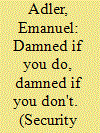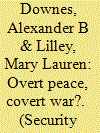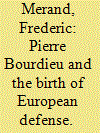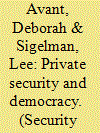|
|
|
Sort Order |
|
|
|
Items / Page
|
|
|
|
|
|
|
| Srl | Item |
| 1 |
ID:
097369


|
|
|
|
|
| Publication |
2010.
|
| Summary/Abstract |
This article seeks to initiate a new round of strategic intellectual innovation in an era when threats posed by non-state terrorist organizations and their state supporters do not resemble Cold War threats. Based on an interpretative sociological reading of the concepts of power, security, and rationality, it argues that a "damned if you do, damned if you don't" dilemma is to the post-Cold War era what the danger of surprise attack or unintended nuclear war was to the Cold War: the defining structural threat of international politics. The dilemma leaves states confronting asymmetrical warfare with the choice of reacting with force to a terrorist act or practicing appeasement. Neither approach, however, can achieve the goal of putting an end to terrorism. Deterrence sustains the dilemma by providing a rationale for why force should be used and why self-restraint is irrational. This article proposes a third option, defusing, which may be accomplished by denial (preventing provocateurs from dragging states into the use of force) and restructuration (transforming the structure and rules of the situation). Defusing relies on "performative power"-the capacity to project a dramatic and credible performance on the world stage and to decouple social actors, their audiences, and their most deeply held strategic beliefs. The force of the argument is illustrated by examples from the global "war on terror," the 2006 Lebanon War, the 2008-09 operation "Cast Lead" in Gaza, and the Iranian nuclear crisis.
|
|
|
|
|
|
|
|
|
|
|
|
|
|
|
|
| 2 |
ID:
097372


|
|
|
|
|
| Publication |
2010.
|
| Summary/Abstract |
The diversionary hypothesis offers a powerful alternative to rationalist explanations of war based on the state as a unitary actor. Most recently, it has been used to explain why democratizing states are more likely to initiate the use of force. In the past two decades, however, quantitative tests have produced mixed and often contradictory empirical results regarding the relationship between domestic unrest and external conflict. This article uses a modified "most likely" case study research design to test the hypothesis. Examination of Argentina's seizure of the Falkland Islands and Turkey's invasion of Cyprus, two cases that should be easy for diversion to explain, provide surprisingly little empirical support for the hypothesis, raising doubts about its wider validity as well as the relationship between democratization and war.
|
|
|
|
|
|
|
|
|
|
|
|
|
|
|
|
| 3 |
ID:
097371


|
|
|
|
|
| Publication |
2010.
|
| Summary/Abstract |
Proponents and critics of the democratic peace have debated the extent to which covert attempts by democracies to overthrow other elected governments are consistent with or contradict democratic peace theory. The existing debate, however, fails to acknowledge that there are multiple democratic peace theories and that inter-democratic covert intervention might have different implications for different arguments. In this article, we first distill hypotheses regarding covert foreign regime change from three theories of democratic peace. Relying primarily on declassified government documents, we then investigate these hypotheses in the context of U.S. covert intervention in Chile (1970-73). The evidence suggests that covert intervention is highly inconsistent with norms and checks-and-balances theories of democratic peace. The evidence is more consistent with selectorate theory, but questions remain because democratic leaders undertook interventions with a low likelihood of success and a high likelihood that failure would be publicized, which would constitute exactly the type of policy failure that democratic executives supposedly avoid.
|
|
|
|
|
|
|
|
|
|
|
|
|
|
|
|
| 4 |
ID:
097373


|
|
|
|
|
| Publication |
2010.
|
| Summary/Abstract |
This paper uses an analytical framework derived from Pierre Bourdieu's sociology to explain the genesis of the European Security and Defense Policy (ESDP). Long-term social and institutional processes at work in the making of ESDP are addressed through an emphasis on the institutionalization of social fields, the impact of structural crises, and the socialization of policy makers into specific schemes of perception and action (habitus). Two arguments follow from this framework. First, the paper shows that the creation of ESDP after 1998 would have been impossible without the prior institutionalization of two transgovernmental arenas: (1) the European foreign policy field, wherein EU diplomats vie for influence over EU policies; and (2) the international defense field, centered upon military relations within NATO. Second, ESDP results from the strategies of a number of diplomats and military leaders who, following the end of the Cold War, perceived that they faced important organizational crises in their respective fields. This sociological framework provides a more nuanced account of ESDP's creation than that proposed by the two dominant explanations in international relations theory-realism's balancing and constructivism's strategic culture convergence. Combining structural and ideational factors, it elucidates three empirical puzzles: the lack of opposition to ESDP when it was launched, the motives of policy makers who proposed ESDP, and the disappearance of alternative options for the European security architecture.
|
|
|
|
|
|
|
|
|
|
|
|
|
|
|
|
| 5 |
ID:
097370


|
|
|
|
|
| Publication |
2010.
|
| Summary/Abstract |
Arguments about the importance of democracy for international behavior assume that states rely on military organizations rather than "hired guns." With the growth of the private security market this assumption no longer holds true. Focusing on the United States, we use original data to compare the impacts of using private military/security forces and military forces on attributes identified as endemic to democracies: constitutionalism, transparency, and public consent. Our evidence indicates that forces raised via contract are harder to learn about and thus less transparent than military forces. Largely due to lowered transparency, Congress has a harder time exercising its constitutional role, which impedes constitutionalism. Finally, though the public is just as sensitive to the deaths of private forces as it is to military deaths, it is less likely to know about them. Thus the lack of transparency also circumvents meaningful public consent. We conclude with a consideration of the potential implications of these changes for U.S. foreign policy.
|
|
|
|
|
|
|
|
|
|
|
|
|
|
|
|
|
|
|
|
|